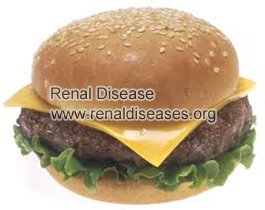Whatsapp: +8615512139310
- Email us:
Nowadays, hamburgers are deeply loved by people throughout the world, especially among the young. However, for people with kidney disease, such as, PKD, is it appropriate to eat hamburgers?
As a genetic disorder, polycystic kidney disease is mainly featured by different sizes of fluid-filled sac on both of the kidneys. With age, the enlarged cysts will oppress the surrounding kidney structures and interfere with kidney function. Eventually, it will develop into kidney failure. And patients may resort to dialysis or kidney transplant to sustain their lives.
Frankly speaking, PKD patients had better not hamburgers, as this delicious food will bring patients many side effects.
1. Increase body weight If PKD patients eat too much hamburgers, the risk of experiencing weight gain will be increased. Meanwhile, the burden of kidneys will be aggravated.
2. Aggravate hypertension and swelling Hamburgers are loaded with salt, if patients eat this food without limitation, symptoms like high blood pressure and swelling are more likely to occur.
3. High phosphorus level Fasts food including hamburgers are usually loaded with phosphorus, if the consumption is not limited, bone disease or skin itching may come into being.
In addition to hamburgers, PKD patients also need to stay away from stimulating foods(hot pepper, shrimp, crab, etc), alcohol, tobacco products, etc, as these foods may stimulate the growth of cysts.
However, only avoid eating the above-mentioned foods are not enough. Luckily, experts and dietitians from our Shijiazhuang Hetaiheng Hospital have come up with a comprehensive dietary plan.
1. Reduce the intake of sodium Generally, the consumption should be no more than 2g.
2. Low-quantity but high-quality protein diet Eat less protein foods can help lower the strain of kidneys, meanwhile, some high-quality protein foods like chicken, lean meat, milk should also be added to your daily diet. If necessary, the consumption of sugar, potassium, phosphorus should also be restricted. If there is still anything unclear, please feel free to consult with our Live Doctor!